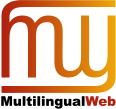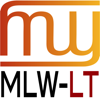Tag(s): mlw
Posts
Luxembourg MultilingualWeb workshop report now available

A report summarizing the MultilingualWeb workshop in Luxembourg is now available from the MultilingualWeb site. Alongside the summaries are links to slides, video recordings, and the IRC log for each speaker and the discussion sessions.
Entitled “The Multilingual Web – The Way Ahead”, the workshop surveyed and shared information about currently available best practices and standards that can help content creators and localizers address the needs of the multilingual Web. Attendees also heard about gaps that need to be addressed, and enjoyed opportunities to network and share information between the various different communities involved in enabling the multilingual Web.
This workshop also included a half-day Open Space discussion session run by Jaap van der Meer of TAUS, where attendees split into breakout groups to discuss topics of their own choosing.
You can also find links to videos, slides, etc as well as links to social media related to the event on the program page of the workshop.
This is the final workshop in the series belonging to the first MultilingualWeb project. The MultilingualWeb-LT project, which follows on from the original project, is holding a workshop in Dublin on 11-13 June entitled The Multilingual Web – Linked Open Data and MultilingualWeb-LT Requirements and plans to hold additional workshops next year that will be similar in format to those run so far.
Program published for MultilingualWeb Workshop in Dublin!

The program has been published for the upcoming W3C MultilingualWeb workshop on Linked Open Data and the MultilingualWeb-LT Project Requirements in Dublin, 11–13 June 2012.
Divided into two portions, the first day (11 June) will focus on Linked Open Data. The keynote presentation will be given by David Orban, CEO of dotSUB, who will be followed by a full day of presentations on various aspects of Linked Open Data. The following two days will deal more specifically with development of the MultilingualWeb-LT project’s requirements document. Speakers come from organizations like Adobe Systems, the European Commission, the World Wide Web Consortium, and leading research institutions from around the world.
See the Call for Participation for details about how to register for the workshop. Participation in the workshop is free.
Important: The deadline for registration is May 30. Please be sure to register by then.
The MultilingualWeb workshops, funded by the European Commission and coordinated by the W3C, looks at best practices and standards related to all aspects of creating, localizing and deploying the multilingual Web. The workshops are successful because they attracted a wide range of participants, from fields such as localization, language technology, browser development, content authoring and tool development, etc., to create a holistic view of the interoperability needs of the multilingual Web.
We look forward to seeing you in Dublin!
W3C Workshop, Call for Participation: The Multilingual Web – Linked Open Data and MultilingualWeb-LT Requirements

11 – 13 June 2012, Dublin, Ireland, hosted by Trinity College Dublin.
Organized by the MultilingualWeb-LT Working Group, the purpose of this workshop is two-fold: first, to discuss the intersection between Linked Open Data and Multilingual Technologies (11 June), and second, to discuss Requirements of the W3C MultilingualWeb-LT Working Group (12 – 13 June). For more information, see the Call for Participation.
Participation is free. We welcome participation from both speakers and non-speaking attendees. However, whereas future MultilingualWeb workshops will continue the wide-ranging format of previous MultilingualWeb events, and will aim again at a larger audience, attendees for this workshop are required to participate actively in discussions and will need to submit a position statement for the workshop registration. There are limited spaces available.
The MultilingualWeb Working Group aims to define meta-data for web content (mainly HTML5) and “deep Web” content (for example a CMS or XML files from which HTML pages are generated) that facilitates its interaction with multilingual technologies and localization processes.
Slides and IRC logs for Luxembourg workshop available

The MultilingualWeb Workshop in Luxembourg was another success, thanks once again to the efforts of the excellent speakers and the local organizers. The program included another Open Space discussion organized by TAUS, and a new feature was a number of poster presentations. We had over 130 attendees.
The program page has now been updated to point to speakers’ slides and to the relevant parts of the IRC logs. Links to video recordings will follow shortly.
There are also some links pointing to social media reports, such as blog posts, tweets and photos, related to the workshop. If you have any blog posts, photos, etc. online, please let Richard Ishida know (ishida@w3.org) so that we can link to them from this page.
A summary report of the workshop will follow a little later.
W3C Launches Work to Simplify Creation of Content in World’s Languages
Today W3C announced new work to make it easier for people to create Web content in the world’s languages. The lack of standards for exchanging information about translations is estimated to cost the industry as much as 20% more in translation costs, amounting to billions of dollars. In addition, barriers to distributing content in more than one language mean lost business. Multinational companies often need to translate Web content into dozens of languages simultaneously, and public bodies from Europe and India typically must communicate with citizens in many languages. As the Web becomes more diverse linguistically, translation demands will continue to grow.
The MultilingualWeb–LT (Language Technology) Working Group will develop standard ways to support the (automatic and manual) translation and adaptation of Web content to local needs, from its creation to its delivery to end users. Read the press release and learn more about the W3C Internationalization Activity. The MultilingualWeb-LT Working Group receives funding from the European Commission (project name LT-Web) through the Seventh Framework Programme (FP7).
Program published for MultilingualWeb Workshop in Luxembourg!

The program has been published for the upcoming W3C MultilingualWeb workshop in Luxembourg, 15-16 March 2012.
The keynote speaker will be Ivan Herman, Semantic Web Activity Lead at the W3C. He is followed by a strong line up in sessions entitled Developers, Creators, Localizers, Machines, and Users, including speakers from Microsoft, WikiMedia Foundation, Joomla!, Intel, the European Commission, Mozilla, CNGL, the UN FAO, and more. On the second day we will hold Open Space breakout discussions, led by Jaap van der Meer of TAUS.
See the Call for Participation for details about how to register for the workshop. Participation in the workshop is free.
Important: In order to gain access to the Commission buildings, you must register by 5th March. Don’t miss the deadline!
The MultilingualWeb workshops, funded by the European Commission and coordinated by the W3C, look at best practices and standards related to all aspects of creating, localizing and deploying the multilingual Web. The workshops are successful because they attracted a wide range of participants, from fields such as localization, language technology, browser development, content authoring and tool development, etc., to create a holistic view of the interoperability needs of the multilingual Web.
We look forward to seeing you in Luxembourg!
MultilingualWeb Limerick workshop report now available

A report summarising the MultilingualWeb workshop in Limerick is now available from the MultilingualWeb site. Alongside the summaries are links to slides, video recordings, and the IRC log for each speaker and the discussion sessions.
Entitled “A Local Focus for the Multilingual Web”, the workshop surveyed and shared information about currently available best practices and standards that can help content creators and localizers address the needs of the multilingual Web. Attendees also heard about gaps that need to be addressed, and enjoyed opportunities to network and share information between the various different communities involved in enabling the multilingual Web.
This workshop also included a half-day Open Space discussion session run by Jaap van der Meer of TAUS, where attendees split into breakout groups to discuss topics of their own choosing.
You can also find links to videos, slides, etc as well as links to social media related to the event on the program page of the workshop.
Preparations have now begun for the next workshop, to be held in Luxembourg, on March 15-16. It will be hosted by the Directorate General for Translation of the European Commission. See the Call for Participation to register.
MultilingualWeb speaker deadline coming, don’t delay!

We are expecting talks from Microsoft, Wikimedia, Mozilla, Joomla, the European Commission and CNGL representatives at the MultilingualWeb workshop in Luxembourg, and we will be filling the remaining slots soon. The deadline for submission of talk proposals is 10th February, so if you want to speak at the event please register as soon as possible. You can submit your proposal on the registration form.
We also recently announced that Ivan Herman, Semantic Web Activity Lead at the World Wide Web Consortium (W3C), will deliver the keynote talk.
This fourth MultilingualWeb workshop will be held in Luxembourg, hosted by the Directorate-General for Translation (DGT) of the European Commission.
The MultilingualWeb project is looking at best practices and standards related to all aspects of creating, localizing and deploying the Web multilingually. The project aims to raise the visibility of existing best practices and standards and identify gaps, with a view to helping content creators, localizers, tools developers, and others meet the challenges of the multilingual Web.
Participation is free. We welcome participation from both speakers and non-speaking attendees. For more information and to register, see the Call for Participation.
Ivan Herman to Keynote at the MultilingualWeb workshop in Luxembourg

Ivan Herman, Semantic Web Activity Lead at the World Wide Web Consortium (W3C), will deliver the keynote talk at the upcoming MultilingualWeb workshop. This 4th MultilingualWeb workshop will be held in Luxembourg, hosted by the Directorate-General for Translation (DGT) of the European Commission.
Ivan will give an overview of the current work done at the W3C related to the Semantic Web, Linked Data, and related technical issues. The goal is not to give a detailed technical account but, rather, to give a general, and accessible, overview and use this is a basis for further discussions on how that particular technology can be used for the general issue of Multilingual Web.
Formerly head of the worldwide W3C Offices program, Ivan has been with the W3C since 2001, and also holds a tenure position at the Centre for Mathematics and Computer Sciences (CWI) in Amsterdam. He is a member of IW3C2 (International World Wide Web Conference Committee), and of SWSA (Semantic Web Science Association), the committee responsible for the International Semantic Web Conferences series.
The MultilingualWeb project is looking at best practices and standards related to all aspects of creating, localizing and deploying the Web multilingually. The project aims to raise the visibility of existing best practices and standards and identify gaps, with a view to helping content creators, localizers, tools developers, and others meet the challenges of the multilingual Web.
Participation is free. We welcome participation from both speakers and non-speaking attendees. For more information and to register, see the Call for Participation.
W3C® liability, trademark and permissive license rules apply.
Questions or comments? xfq@w3.org
